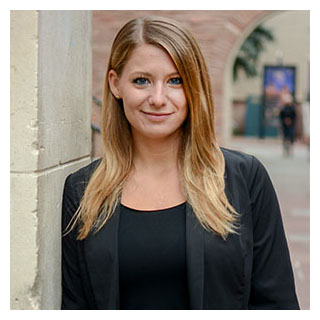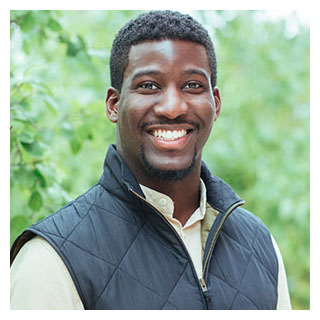Two Instructors Lead and Learn with CEP
By Ross Middleton
In today’s atmosphere of division and uncertainty, community involvement may be more important than ever. Service-learning can help students become more informed about pressing local issues, and civic engagement provides young learners with pathways to personal development as they work to solve problems outside the classroom. To ensure these learning opportunities are effective and properly contextualized, instructors must be perceptive and skilled leaders. Two experienced educators—Marvin Vilma and Kirsten Musetti Tivaringe—have brought their leadership knowledge to Center for Talent Development’s Civic Education Project (CEP), inspiring students through an intentional approach to community service.
Both Marvin and Kirsten were familiar with CEP before teaching in the program: Marvin had recommended CEP and CTD to students in search of extracurricular activities, and Kirsten participated in CEP's CivicWeek as a teenager. “Because my experience was so moving, I wanted to contribute to guiding students to expand their horizons and develop a clearer pathway for their passion,” Kirsten explains. Marvin, an instructor of CEP’s Leadership Intensive program this summer, also connected to the values of CEP on a personal level, and was drawn to the way “academically inclined, super curious” students chose to engage with their communities. “It was really aligned with how I approach education as a teacher,” he notes.
students in search of extracurricular activities, and Kirsten participated in CEP's CivicWeek as a teenager. “Because my experience was so moving, I wanted to contribute to guiding students to expand their horizons and develop a clearer pathway for their passion,” Kirsten explains. Marvin, an instructor of CEP’s Leadership Intensive program this summer, also connected to the values of CEP on a personal level, and was drawn to the way “academically inclined, super curious” students chose to engage with their communities. “It was really aligned with how I approach education as a teacher,” he notes.
Introducing students to service-learning and appropriately contextualizing current events requires perspective, and both educators applied their training and lived experiences to their work with CEP. In addition to the “eye-opening immersive leadership experience” of Kirsten’s own CTD coursework, the educator uses skills honed in Teach for America and international service-learning projects to develop a pedagogical style centered in social justice. “I keep coming back,” Kirsten says, “to cultivate collaborative spaces where inspiring students can learn from experts and each other as they form partnerships towards positive social change.”
Marvin had firsthand knowledge of the importance of listening, understanding, and awareness in community outreach. “Having been born in an under-resourced and underserved community gave me a lot of perspective,” Marvin explains, adding that he also participated in volunteer efforts as a high school student, including offering relief in New Orleans after Hurricane Katrina. “I wanted the students to interact very respectfully in the communities we entered. Seeing people ‘fly in and fly out’ didn’t always feel good when I was growing up, so I wanted CEP students to do it respectfully, do it kindly, do it in a way that felt authentic and genuine.” Marvin adds that teaching at a boarding school helped him understand the residential life component of the CEP student experience.
Once CEP sessions were underway, Marvin and Kirsten were moved by the energy and character of their students. Marvin’s students canvassed in local communities to talk about local issues, met with leaders from area nonprofits, and tended to an urban garden, among other activities. Even traveling on Chicago public transit proved illuminating for some CEP participants unfamiliar with the city. “The level of insight they were able to draw from their experiences was impressive to me,” Marvin observes.
 “I come back program after program to learn with and from gifted and talented students who impress me with more than their test scores or vocabulary,” adds Kirsten, who has also worked with the Civic Leadership Institute and other CTD programs throughout the year. The educator explains that valuable learning often occurs outside of traditional classroom settings, and that this learning can be powerful and motivating for teachers as well as students. These moments of discovery can lead to further inquiry, Kirsten explains, but they reinforce that “we have the tools and the community to create movements.”
“I come back program after program to learn with and from gifted and talented students who impress me with more than their test scores or vocabulary,” adds Kirsten, who has also worked with the Civic Leadership Institute and other CTD programs throughout the year. The educator explains that valuable learning often occurs outside of traditional classroom settings, and that this learning can be powerful and motivating for teachers as well as students. These moments of discovery can lead to further inquiry, Kirsten explains, but they reinforce that “we have the tools and the community to create movements.”
Marvin and Kirsten both emphasize the importance of seeking challenges as part of CEP, noting the way the program provides students with an accepting, collaborative environment. “We create a space where every student can voice their opinion, where they can learn information about different issues, and reevaluate their opinions based on the interactions they have,” says Marvin. Kirsten echoes the importance of students exploring new ideas, challenging personal preconceptions, and learning from their peers. A focused service-learning program can inspire students to support communities with positive change, and it can challenge them to become more knowledgeable about previously unfamiliar experiences. “If you’ve heard the phrase think before you speak,” Kirsten notes, “CEP & CTD provide tools and frameworks to learn before you act and keep learning.”
 Ross Middleton is an independent writer and formerly part of CTD’s Summer Program staff. He received his BA in English Literature from Wesleyan University and an MFA in Writing from Sarah Lawrence.
Ross Middleton is an independent writer and formerly part of CTD’s Summer Program staff. He received his BA in English Literature from Wesleyan University and an MFA in Writing from Sarah Lawrence.

